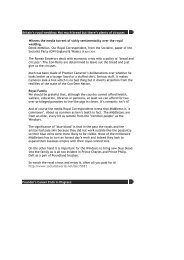Youth, Knowledge and Violence - Centre for Civil Society
Youth, Knowledge and Violence - Centre for Civil Society
Youth, Knowledge and Violence - Centre for Civil Society
Create successful ePaper yourself
Turn your PDF publications into a flip-book with our unique Google optimized e-Paper software.
frequent term papers from students. Okebukola’s belief is that students nowadays have too much time on their<br />
h<strong>and</strong>s hence the numerous opportunities to participate in secret cults. He is also of the opinion that religious<br />
organizations should be enlisted in the fight against campus cults.<br />
Views on means to curb campus secret cults are numerous just as there are several opinions on why those<br />
cults proliferate. In this respect, the views of Professor Ayo Banjo, <strong>for</strong>mer Vice Chancellor of the University of<br />
Ibadan are highly instructive: “… I think it is too late to try <strong>and</strong> kick out cultism in our universities. There is very<br />
little we can do about it. If we have got things from primary schools, <strong>and</strong> if education is qualitative, leaving no time<br />
<strong>for</strong> idle h<strong>and</strong>s, the question of cults wouldn’t have been here at all. For example, cultism is spreading, I think<br />
proportionally with the expansion of the educational system. We must be prepared <strong>for</strong> that, the more people you<br />
bring into the system, the more people who don’t deserve it. And in this country, you hear all kinds of rumours of<br />
people presenting JAMB (Joint Admissions Matriculation Board) results which are not genuine. The university is<br />
not a re<strong>for</strong>matory. It is not a bus-stop where you bring criminals <strong>and</strong> you ask the university to turn them into decent<br />
people. The university doesn’t have time <strong>for</strong> that, rather it wants good people who are morally <strong>and</strong> intellectually<br />
sound to make them better. They are not to re<strong>for</strong>m anybody. You can’t blame any university. If you send them the<br />
wrong stuff, you cannot pass the buck to them. Universities have more important things to do”.<br />
To minimize the rapid explosion of the student population in Nigerian universities some analysts have advocated the<br />
introduction of fees which are now being implemented. Let us return to Professor Banjo’s views. It is clear that the<br />
public <strong>and</strong> student perceptions of what the university ought to be can misleading. Or perhaps, the university is now<br />
expected to enact roles <strong>for</strong> which it is quite obviously ill-equipped. The university is not in a position to act as a<br />
re<strong>for</strong>matory as Banjo correctly argues but whether the Nigerian public accepts this view is another matter entirely.<br />
Initiatives have commenced to combat cultism in Nigerian campuses. Engineer J. A. Adeoti, a <strong>for</strong>mer<br />
Deputy Rector of the Yaba College of Technology advocates the blacklisting <strong>and</strong> expulsions of cultists from<br />
institutions. The Ogun State Committee on Tertiary Institutions has resolved not to admit any student proven to be<br />
involved in cultism in any school within the state. Committee of Vice Chancellors on its part has set up a computer<br />
network connecting all higher institutions within the country to provide in<strong>for</strong>mation on students implicated in<br />
cultism. These are all commendable ef<strong>for</strong>ts but what must be remembered is that the University is not a place that<br />
provides full re<strong>for</strong>matory care to people with proven criminal tendencies. Something must also be done about both<br />
the disturbing state of primary <strong>and</strong> secondary education together with the unplanned student population in tertiary<br />
institutions. Only then will any meaningful progress be achieved in the fight against cultism.<br />
The militarization of the Nigerian polity during the years of protracted militarism definitely had an adverse<br />
effect on the health <strong>and</strong> vibrancy of civil society. Even the military establishment itself has been severely<br />
undermined by its own undisciplined politicization <strong>and</strong> violence. In addition, undesirable aspects of the military<br />
ethos have infiltrated civil society. This seepage of the military ethos into civilian life is reflected in secret cults’<br />
fascination with militaria. Militarism led to the corruption of democratic values <strong>and</strong> spaces in ways that we would<br />
hardly imagine. The militarization of academic life is just one manifestation. The larger social context has also been<br />
corrupted.<br />
Wole Soyinka <strong>and</strong> his colleagues had established an association to counter-act certain excesses of<br />
colonialism. His association grew to prominence on Nigerian campuses until a gross (mis)appropriation of ideals by<br />
other associations occurred. This misappropriation is part of the reason <strong>for</strong> the violence of secret cults. A process of<br />
denigration <strong>and</strong> a bastardization of values occurred which appalled Soyinka himself <strong>and</strong> which appalled the military<br />
establishment as well. Secret cults are in part a response to the militarization of the Nigerian public space <strong>and</strong> in a<br />
very fundamental way, they came to typify <strong>and</strong> project the very worst aspects of a misshapen military culture.<br />
16
















